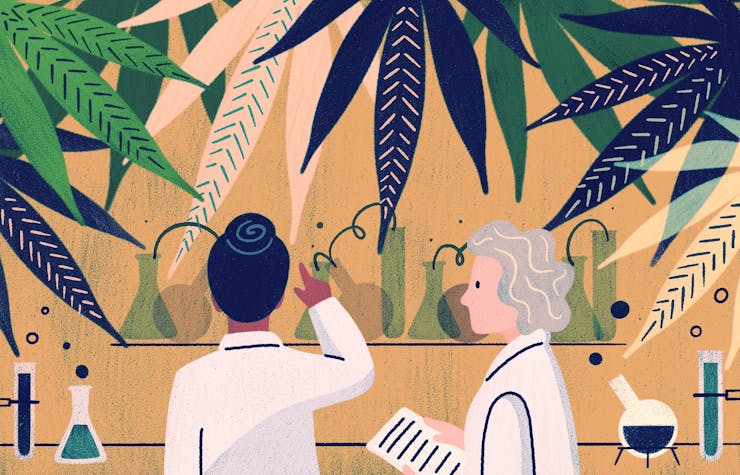The most exciting new frontier in cannabis research this year wasn’t any individual study or published report. It was a pair of developments (one in Canada, the other in the United States) that together promise to spur the research studies of the future on a scale never seen before, with a scope of inquiry that includes exploring potential benefits, rather than myopically focusing on potential harms.
It’s with a mix of excitement and trepidation that we move into the next phase of cannabis research, still hoping to unlock the plant’s therapeutic potential without letting Big Pharma reap all the profits.
First, Canada’s federal legalization of cannabis, which went into effect on October 17, has ended many burdensome restrictions on research, leaving the federal government keen on providing grants to spur promising studies.
And, this August, the US Drug Enforcement Administration made moves to dramatically increase the amount of cannabis legally grown for research purposes in the United States. Not coincidentally, a few months later, the National Center for Complementary and Integrative Health announced a large-scale, federally-funded study of terpenes and “minor cannabinoids,” a category which includes compounds in the cannabis plant that might be medicinal beyond THC.
It’s with a mix of excitement and trepidation that we move into the next phase of cannabis research, still hoping to unlock the plant’s incredible therapeutic potential without letting Big Pharma swoop in and reap all the profits.
In the meantime, this past year produced some of the most promising research to date on cannabis as a treatment for a wide range of serious ailments.
Here’s what we learned in 2018.
Cannabis Safely, Effectively Provides Pain Relief to Seniors
By all accounts, those 65-and-over are the fastest growing demographic of cannabis consumers, but seniors still remain the largest voting block against legalization.
Shop highly rated dispensaries near you
Showing you dispensaries nearOften finding out that other seniors benefit from cannabis is the key to changing their opinion. So if you’ve got a grandparent who’s on the fence, hearing about a study published in February 2018 in the European Journal of Internal Medicine could give them the nudge they need to consider trying cannabis, or at least to agree it should be legal for others.
In the study, over 900 elderly Israeli patients (75% of whom had no prior history with cannabis consumption) used medical cannabis for at least six months, with 93% of patients reporting that cannabis improved their symptoms—particularly chronic pain sufferers, who on average reported that cannabis reduced pain from an 8 (on a scale of 10) to a 4.
Cannabis Enhances Pain-Relief from Opioids
Those opposed to cannabis still fall back on the long discredited “gateway theory” to argue that legalization will lead users down a slippery slope to more dangerous drugs. While those in favor of legalization point to a plethora of data indicating just the opposite, like a November 2018 study that showed cannabis dispensaries significantly reduce the number of opioid overdoses in their immediate vicinity.
By adding cannabis to their treatment plan, pain patients can get the same amount of relief from smaller doses of opioids, thus reducing dependence and other potential harms.
What’s less often understood, however, is that cannabis can be combined with prescribed opioids to create a synergistic effect. A February 2018 study published in Neuropsychopharmacology showed that in a double-blind, placebo controlled study, “cannabinoids combined with opioids produce synergistic antinociceptive effects, decreasing the lowest effective antinociceptive opioid dose (i.e., opioid-sparing effects) in laboratory animals.”
In other words, by adding cannabis to their treatment plan, pain patients can get the same amount of relief from smaller doses of opioids, thus reducing dependence and other potential harms.
CBD Has Profound Antidepressant Effect in Rodents
Cannabidiol (CBD) has gone from being obscure to trendy in just a few years, an incredible story that continues to unfold as the compound’s future legal status is hotly debated. Best known as a key component of the cannabis oil given to children with Dravet Syndrome and other severe seizure disorders, CBD also has proven pain relieving and anti-inflammatory properties.
And now, according to a study published in Molecular Neurobiology, we may soon add antidepressant to the list. Researchers in Brazil working with rodents noted that CBD reduced depression associated behaviors after a single dose, improvement that lasted a full week after the treatment.
Cannabis Enhances Sex
In a 2010 article,Psychology Today looked at what limited data exists on cannabis and libido, and determined that while “the sexual effects of every other mood-altering drug—alcohol, amphetamines, antidepressants, cocaine, narcotics—are well-documented, fairly consistent, and not particularly controversial…oddly, marijuana’s sexual effects are highly unpredictable, from strongly sex-inhibiting to strongly sex-enhancing.”
Three new studies published in 2018 point to cannabis enhancing sexual pleasure and increasing sexual frequency.
Three new studies published in 2018 have greatly expanded our knowledge since then, and they all point to cannabis enhancing sexual pleasure and increasing sexual frequency.
The first two studies, conducted by researchers at St. Louis University in Missouri, surveyed hundreds of women and found that among those who had used cannabis immediately prior to sex, 3% called it sex-ending, 65% called it enhancing, 23% said it made no difference, and 9% expressed no opinion.
In the final study, researchers at Stanford University extracted data on tens of thousands of American adults taken from the National Survey of Family Growth, and found that compared with abstainers, men who consumed cannabis weekly reported 22% more sex, and women reported 34% more, with sexual frequency even higher among those who used more than once a week.
CBD May Help Treat Methamphetamine Addiction
While much study has gone into determining the potential of cannabis to lessen the damage of the current opioid epidemic, there’s also a growing push within the addiction recovery movement to recognize that cannabis could play a positive role in recovery from all kinds of addictions, whether as a replacement therapy to curb cravings, or as a safe and natural way to deal with the symptoms of withdrawal.
Researchers at at the University of Sydney and Macquarie University in Australia in September 2018 published a study that found cannabidiol (CBD) in doses of 80mg per kilogram of body weight reduced the motivation of rats “to self-administer methamphetamine and relapse to methamphetamine-seeking behavior following abstinence.”
This was the first study to ever look at addiction to meth specifically, and it joins recent research showing similarly positive results for cannabis as a potential treatment for opioid addiction and tobacco smoking.
CBD Restores Brain Changes Caused By Regular Cannabis Use
In 2003, the US Department of Health and Human Services was granted a patent on “cannabinoids as neuroprotectants,” based on evidence that compounds found in the cannabis plant are effective in “limiting neurological damage following…stroke and trauma, or in the treatment of neurodegenerative diseases, such as Alzheimer’s disease, Parkinson’s disease, and HIV dementia.”
But that doesn’t mean that every way cannabis changes the brain is entirely positive. One potentially troubling result of frequent THC-rich cannabis use is a reduction in size of the hippocampus, which is involved in cognitive performance, controlling anxiety, and tamping down stress.
Neuroscientists in Australia recently sought to determine if cannabidiol (CBD) could restore that loss, and found that after 10 weeks of giving four 50-milligram CBD capsules per day to regular cannabis smokers, their hippocampus anatomy had been markedly restored—even among subjects who’d continued to consume THC-rich cannabis throughout the test period.






